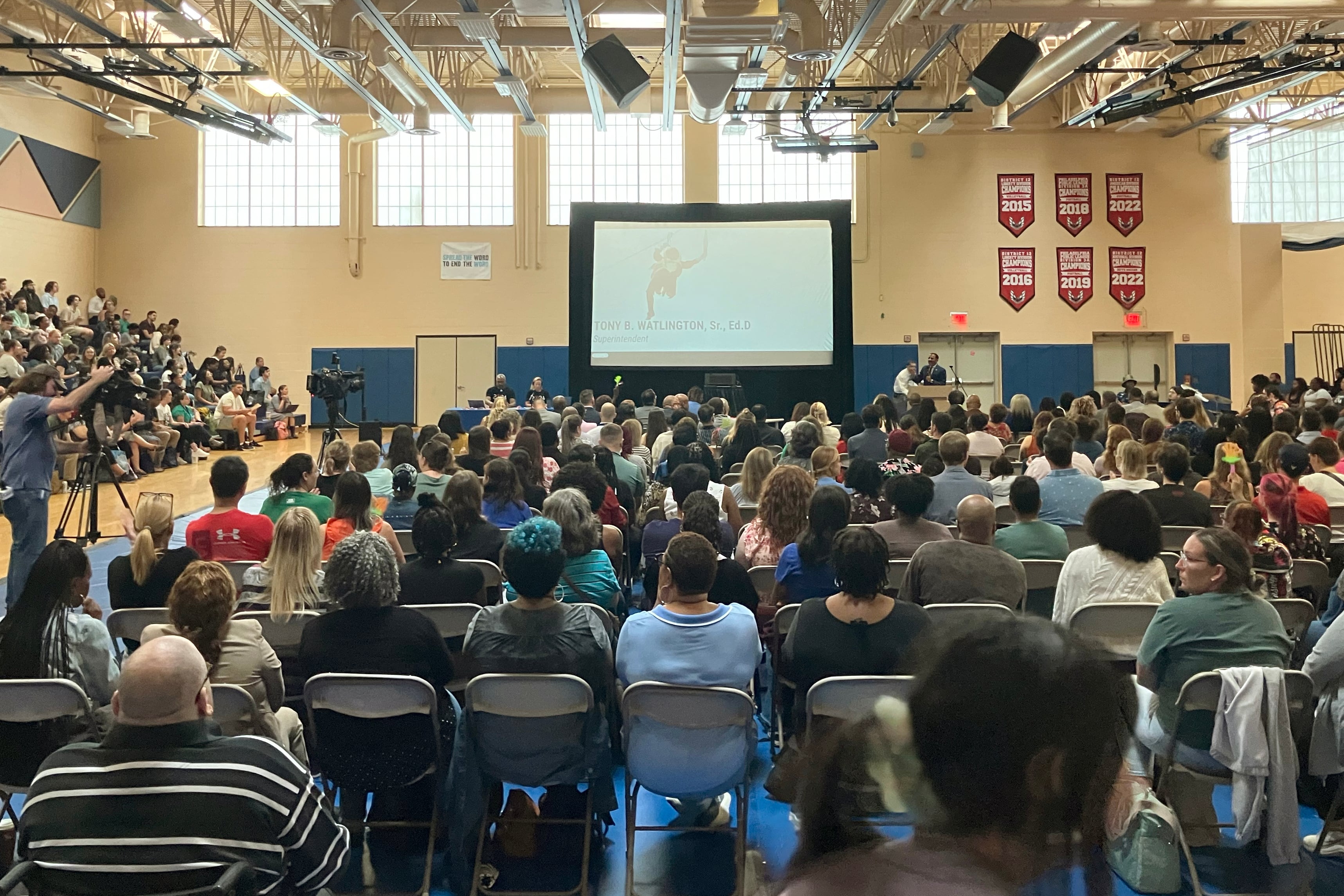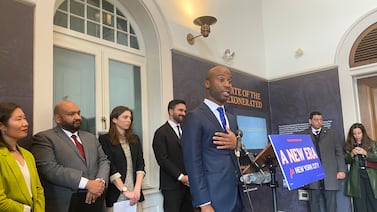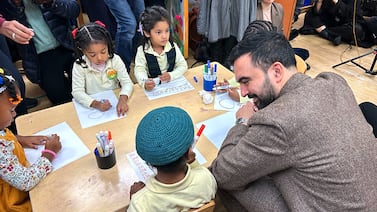Sign up for Chalkbeat Philadelphia’s free newsletter to keep up with the city’s public school system.
Some 800 new teachers are entering Philadelphia classrooms for the first time this year. They come from a variety of backgrounds, but share a desire to inspire their students and make an impact on young lives.
Philadelphia’s newest educators are arriving at a crucial time for the school district. School leaders have been dealing with significant challenges including an ongoing teacher shortage, decades of underfunding, aging facilities, new curriculum mandates, and a rising number of students experiencing homelessness.
At a new teacher orientation at The School of the Future this month, Philadelphia Superintendent Tony Watlington said this year, he wants new teachers to focus on their “ambition and joy.” But above all, Watlington said he wants those joining to stick it out — even when things get tough.
“You’re gonna have some great days, you’re gonna have some good days and there are going to be some challenging days,” Watlington said. “Whatever you do, don’t go home and quit.”
According to Watlington, the district will be starting the school year with 95% of teaching positions filled. But that still means thousands of students may find themselves without a permanent, certified teacher this year. And those vacancies will also mean heavier workloads for other teachers, paraprofessionals, and other school staff.
The journey to the classroom has looked different for every new educator this year.
Many came through traditional college degree programs and are taking teaching roles as their first jobs, while others got a taste of the classroom experience as paraprofessionals and pursued their full-time certification through teacher pipeline programs offered by the district, charter schools, and colleges like Cheyney University.
Some new educators never considered teaching until they stumbled upon alternative programs like Breakthrough of Greater Philadelphia’s student teaching fellowship program.
Watlington said the district will be there as well to support teachers who struggle.
“You chose us, we choose you back and we’re gonna have your back.” Watlington said.
Chalkbeat spoke to several new teachers this year to get a sense of how they’re feeling, why they decided to become educators, and any advice they’d give to others considering joining the teaching workforce. Here are five of their stories.
How broken water fountains influenced a teacher’s approach
Kenny Chiu says his background as a child of immigrant parents gives him a special connection to students from different cultural perspectives.
Chiu’s parents immigrated to Philadelphia from China a few years before he was born. Chiu grew up in Chinatown and South Philly and said he’s a proud product of the city’s public school system.
He’s currently a senior at The University of Pennsylvania and said he is “99% sure” he’ll be pursuing his certification to teach full-time when he graduates. He’s been teaching seventh grade history to Philadelphia public, charter, and parochial school students at Germantown Friends School this summer through Breakthrough’s teaching fellow program. Chiu said it’s been an eye-opening and fulfilling experience.
Chiu said he remembers attending school with 35 kids per class, broken water fountains, and out-of-order bathrooms, with no school nurse on duty. It’s that personal experience and understanding he hopes to bring to his students.
“There are a lot of issues outside of teachers’ control that teachers have to deal with,” Chiu said. “It’s a lot of pressure also to have such a big task of educating young people in our city.”
Chiu said he learned a lot through Breakthrough’s fellowship program this summer. He found it useful to get a sense of classroom teaching — with a lot of mentorship and support — before he has to make any big career decisions.
Chiu said he is “really looking forward to being someone that students can look up to. Whether you’re struggling in school or struggling with things outside of school, I really want to be a solid mentor and solid support for them.”
Students will ‘see through’ BS from teachers
This is technically Mark Bey’s 27th year teaching, but it’s his first time teaching in his home city for many years.
Bey will be teaching Spanish at Paul Robeson High School this fall. He first started teaching in the Philadelphia school district in 1998 but moved to New York City where he taught for several years. Now, he said he’s looking forward to being back home.
Bey said he missed Philly’s “diverse population” both in terms of demographics of the students and the teacher and school leadership population, which he “found lacking in New York City.”
Despite his experience, Bey said he still gets nervous for the first day of school.
His advice for other new teachers: “Be your authentic self.”
“If you present BS to the students, students will see through it,” he said. Bey recommends incorporating your passions into lesson plans. For example, as an avid photographer, Bey said he starts every class off with a photo prompt and discussion. Many of the images he’s taken himself on his travels.
Bey said his students really engage with the exercise because it’s clear he’s sharing something he cares about and it gives his students permission and encouragement to share things they care about as well.
Longtime paraprofessional transitions to full teaching job
Dontaya Sellers, a longtime paraprofessional in the district, will be teaching fourth grade English Language Arts and Science at Joseph Pennell school for the first time this fall.
Sellers is a Cheyney University graduate who was a paraprofessional for many years before pursuing her full teaching certification this year. She said that because of her history with the school district and her connections at Cheyney, she was able to get her certification fully paid for through the district’s Para Pathway program.
“I love kids. I’ve always loved kids,” Sellers said. She said with all of the news about national teacher shortages, and the calls for new teachers, “I felt like this was the time to do it.”
Sellers said she’s “really excited” to get to know her students, parents, and staff, but she’s also feeling some anxiety.
“I know things don’t always happen the way our minds think they’re gonna happen,” she said.
‘This is our classroom, this is our home’
Marissa Rivers is another former paraprofessional entering the 2024-2025 school year as a fully certified elementary school teacher at Universal Alcorn Charter School.
Teaching is a second profession for Rivers. She started off in human resources and management, in charge of recruiting and interviewing job candidates. Rivers said when she was interviewing new, younger employees — mostly 17- and 18-year-olds — she realized they were “lacking in certain areas” that made companies pass them over.
“I felt that it was important for me to go back and want to be a part of resolving that problem. And how do you do that? You go back in the classroom,” Rivers said.
Rivers made the transition from the business world to the classroom as a paraprofessional in a second grade classroom in Philadelphia. But because her school was short staffed, she was asked to step up to serve as a full-time second grade teacher while she was in the process of getting her degree and certification.
“I was able to take everything that I was learning in my classes and directly apply it,” Rivers said. She said when she saw her students struggling, she was able to reach out to her teacher training mentors for help.
Her advice for other new teachers is to get students involved in the classroom rulemaking process.
“What I like to do at the beginning of the school year, we all come up with the class rules together, and that makes them a part of the classroom,” Rivers said. “It’s not like a directive, but it’s more of ‘this is our classroom, this is our home, and these are the rules that we are going to follow.’ And when we come up with it together, it’s easier for them to remember.”
Rivers said she’s most nervous about helping students behind in their reading catch up to their peers and to grade-level expectations.
“I want to make sure that I do everything that I can to get those students to go above and beyond,” Rivers said.
Two young women share a passion for teaching
Dena Hill, 21, is originally from Germantown, just recently graduated from Cheyney and is entering a classroom for the first time this year. She’ll be teaching special education, one of the hardest to fill positions in the district.
The shortage of Black teachers is also something Hill, who is Black, has been thinking about.
“I know how much my teachers impacted me,” Hill said, " I would love to do the same for children that look like me.”
Hill said she is looking forward to “actually seeing that ‘aha’ moment on [a student’s] face when they actually grasp a concept.”
Hill attended new teacher orientation this month with her friend and Cheyney classmate Brooklyn Stanback, 22. Both young women share their passion for the profession. Stanback will be teaching fourth grade math.
“I still have good connections with all my teachers, especially from preschool,” Stanback said. “I want to be that next impact for somebody else. I want to be the person they look up to.”
For Stanback, she’s most excited about bringing a new energy to her classroom.
“I’m somebody that’s really energetic, I like to get everybody hyped,” she said.
But it’s the unknown that makes Stanback and Hill nervous.
“Not knowing how I’m going to reach the kids or what type of situation I’m walking into,” Stanback said. “That’s what every teacher is really nervous about.”
Carly Sitrin is the bureau chief for Chalkbeat Philadelphia. Contact Carly at csitrin@chalkbeat.org.






